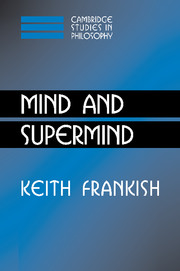Book contents
7 - Conceptual modularity
Published online by Cambridge University Press: 22 September 2009
Summary
The previous chapter looked at the claim that propositional attitudes are functionally discrete. I now want to consider a similar thesis about concepts – conceptual modularity, as it has been dubbed. Again, I shall argue that there is a folk commitment to the thesis and that this commitment can be vindicated at the supermental level, without involving claims about the brain. The chapter concludes with some further remarks about eliminativism and the future of folk psychology.
THE CASE FOR CONCEPTUAL MODULARITY
Conceptual modularity is a thesis about the nature of concepts, understood as psychological states and capacities. We can think of it as having two aspects, which I shall call modularity of process and modularity of vehicle. Modularity of process is the claim that there is a common capacity involved in each application of a particular concept. So, for example, if I possess the concept bachelor, then I possess some discrete capacity which can be applied in all my various thoughts about bachelors. Modularity of vehicle is the claim that thought tokens have distinctive physical properties, which correspond to their semantic properties and activate the corresponding conceptual capacities. (I shall refer to such physical properties as syntactic ones.) So when I entertain the thought that Cliff is a bachelor, my thought token has a physical property which is correlated with the semantic element bachelor and activatesmy capacity for thinking about bachelors.
Information
- Type
- Chapter
- Information
- Mind and Supermind , pp. 184 - 202Publisher: Cambridge University PressPrint publication year: 2004
